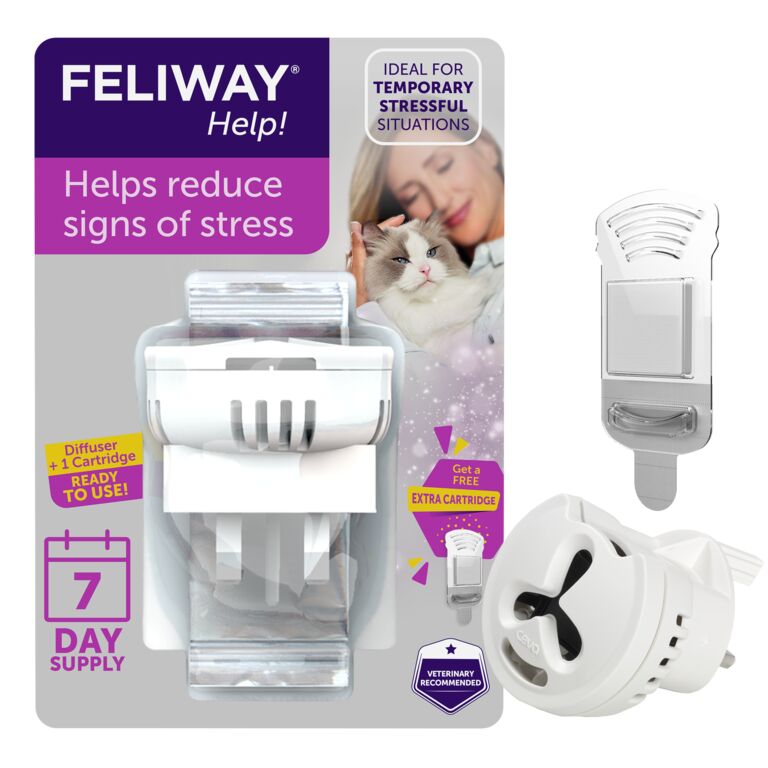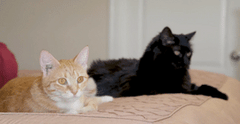HOW TO HELP STOP CATS FIGHTING WITH EACH OTHER
Tips To Stop Cats Fighting
-
Use FELIWAY Optimum to help restore harmony between cats
- Releases “serenity messages” to help cats get along
- Scientifically proven: reduces fighting or signs of tension
- Helps even if the cats have been fighting for years
- Plug the diffuser in the area where your cats spend most of their time
-
Follow living together “golden rules”
- Number of resources: each cat should have their own food bowl, water bowl, litter tray, scratching post etc
- Separate resources: spread resources around your house, so 'dining rooms' are away from 'bathrooms'. Make sure each of your cats has their own space
-
Conflict management
- Do not punish your cats when you see signs of conflict
- This would increase their stress and therefore aggravate the conflicts.
- This would increase their stress and could lead to more conflict
- Manage your cats' resources (see above)
- Ensure there are different options for your cat to escape to safety
- Provide plenty of opportunities for your cat to hide and to be in elevated places (try and make sure they can access these without being in contact with another cat)
We recommend:
-
Seen on TV
-
Recommended by vets
-
+ 1 million Facebook likes
-
+ 25 years of expertise

TESTIMONIALS
iscover how FELIWAY helped these cats to stop fighting and get along better:
FREQUENTLY ASKED QUESTIONS - CAT FIGHTING
ARE MY CATS PLAYING OR FIGHTING?
Cats are naturally solitary animals and are not designed to live in close social groups. They can be friends, especially if they have grown up together from kittens, but other times cats will just tolerate each other and signs of conflict can be very subtle.
Cats fighting and playing can sometimes look very similar! If your cats are just playing they will be silent, with gentle biting, retracted claws, and chasing both ways.
If your cats are biting seriously, have their claws out, and you hear screams, they are not best friends! Chasing in only one direction is another sign of conflict.
More subtle signs of conflict include: staring at each other, blocking each other's pathways and hiding away.
WHY DO CATS FIGHT?
The typical cause of conflict is competition for resources such as food bowls, water bowls, litter boxes, and scratching posts. So make sure to give each cat their own set of resources and put them in separate areas to avoid tension caused by competition.
Remember, you can put them on different levels, one on the floor and higher up. To find out even more see our article on why cats fight.
HOW TO HELP CATS GET ALONG
When there are signs of conflict or tension between your cats, it may not resolve with time. You need to act now as cats do not reconcile after conflict. Essentially, cats find it hard to forgive and forget.
Using FELIWAY® Optimum will help your cats get along and live together in harmony. Use several diffusers if cats use
different rooms. See our article on the 7 tips to stop cats fighting.
INTRODUCING CATS TO EACH OTHER
Are you considering getting another cat? If so, it is vital to get their first meeting right as this can set the tone for their future relationship.
Learn more from our article, Introducing Cats Together.
When your cat, who normally uses a litter box starts to use the bathroom elsewhere it's not pleasant for us and it is usually not pleasant for them either.
It is important to rule out any health problems first. Next, you need to be able to differentiate between urine marking, which is symbolized by small spurts of urine all over the house, and other reasons for not using the litter box, such as a poorly maintained litter box, one that is too small, or one that has a litter substrate that your cat does not like. The litter box may also be in a position that is not ideal for your cat.
Your cat may find an alternative place that they feel comfortable peeing in, such as your bed, or maybe indicating that they are not coping with a stressful situation.
DO FEMALE CATS FIGHT WITH MALE CATS?
Yes, female cats can fight with male cats. There are many reasons why aggression can occur between cats, many of which are often related to a cat’s territory. This could be due to a cat defending their space, access to their resources, or friction between cats who live together. Both male and female cats have territorial instincts and females may defend their space just as much as males.
FELIWAY® Optimum can be an effective solution for addressing social issues, releasing “serenity messages” to help cats get along. FELIWAY® Friends can also help to reduce common signs of tension and conflict between cats, such as chasing, blocking, or more obvious physical fights.
DO BONDED CATS FIGHT?
Just like us humans, who may not always get on perfectly with even our best friends, bonded cats can occasionally fight. These flare-ups could be due to changes that affect one or both of your cats and put a strain on the relationship. For instance, this could be a hange in routine, visitors to the home, or a recent visit to the vet.
It’s also important to note that bonded cats will often playfight with each other. This is a fun and enjoyable activity for cats that shouldn’t be discouraged, so it helps to be able to recognize the difference between the two.
Ensuring each cat can access resources when they want to can help minimise conflicts. If fights become frequent or intense, consult with a veterinarian or qualified behaviourist to address any underlying issues or provide a plan to address the behaviour. FELIWAY® Optimum also helps to restore harmony in the home, and, as with FELIWAY® Friends, can reduce the common signs of tension and conflict between cats.
WHY DO CATS AND DOGS FIGHT?
Cats and dogs may fight due to their natural instincts and differing communication styles. Some breeds of dog have a strong chase instinct that can trigger them to run after cats, while cats may perceive dogs as a threat to their territory or safety. It may be that a dog is approaching a cat in a friendly manner, but cats can interpret this as a threat and will usually try to run away.
Gradual introductions and creating a safe environment for both cats and dogs can help to reduce conflicts, while supervision to step in if needed can also be helpful. With time and patience, many cats and dogs can learn to coexist peacefully or even form close bonds.
Read our full guide for more information on building a bond between cats and dogs.
WHY DO SIBLING CATS FIGHT?
Environmental changes can put strain on one or both cats, and that may make them more likely to become confrontational. If you notice your cats fighting, FELIWAY® Optimum can be an effective solution that releases “serenity messages” to help cats get along.
This being said, sibling cats may also simply grow apart as they get older! As they socially mature, it’s not uncommon for cats to choose to spend their time more independently.
IS IT NORMAL FOR CATS TO FIGHT?
Yes, it’s normal for cats to fight occasionally. Territory is very important for cats and they’ll want to protect their space, as well as access to their resources within it!
While cats are naturally solitary hunters, they can be helped to share their space with another cat they can tolerate, even if they’re never going to become the best of friends. Providing ample space, resources, and separate areas will help to reduce conflicts. FELIWAY® Optimum can also be an effective solution for creating a comfortable and secure environment.
It’s important to look for both subtle and obvious signs that your cats have been fighting, and if conflict persists, seek advice from a vet or qualified behaviourist.
DOES FELIWAY® WORK FOR FIGHTING CATS?
Yes, a FELIWAY® Optimum diffuser can help reduce fighting between cats by releasing “serenity messages”. These help a cat to feel reassured and comforted in their home, and can help reduce conflict between cats living together.
FELIWAY® Friends can also help to reduce common signs of conflict between cats, including fighting, chasing, and blocking.






































